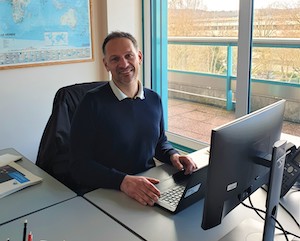Stéphane Bourgeon, an IFP School graduate, has been Supervisor of the Energy and Processes program (ENEP) since January 2023. He looks back on his career and reveals his ambitions for his students.

1. Tell us about your background.
As a Chemical Engineer from the European School of Chemistry, Polymers and Materials in Strasbourg (ECPM), I discovered IFP School during my gap year spent doing an internship in catalyst development at IFP Energies nouvelles.
At the end of my studies, and thanks to a scholarship, I joined IFP School to pursue a Master's degree in Refining, Engineering and Gas, the forerunner of the ENEP program.
With my degree in hand, I started my career in September 2001 at TotalEnergies as a Process Engineer at the Grandpuits refinery. This first experience in the field allowed me to directly put into practice the skills I had acquired at the School and to gain a global understanding of a refinery’s operations. My first month was marked by two events that shaped my career: the explosion at the AZF site in Toulouse and the attack on the World Trade Center in New York. The question of operational safety and therefore, of simply being professional at all times (i.e. being competent, learning, being trained, the importance of the team) would be at the heart of my engineering assignments.
Four years later, I moved to Normandy, where I worked on the manufacturing of base oils. I was responsible for the quality of production and the safety of operations.
In 2008, I moved to Paris to take up a position in the management of a refinery. I was responsible for the economic optimization of the Donges refinery. As part of my duties, I oversaw the supply of crude oil and specialised products such as bitumen and LPG.
Two years later, I joined the Group's Gas and New Energies branch to work on gasification and the conversion of coal into olefins. Reporting to the Technical and Research Department, I led a project on CO2 capture from a Chemical Loop Combustion (CLC) developed in partnership with IFPEN.
I then moved to the Training Department of TotalEnergies, where I headed the Industrial Risk Management Department. For five years, I designed and deployed managerial safety training for the group and its subsidiaries.
In 2017, I joined the Exploration-Production branch and became a Career Manager. As an HR partner, I was responsible for recruiting specialists and enabling them to develop and expand their skill set.
I finished my career at TotalEnergies as an HSE Coordinator in the Safety Department working on wind, gas and solar activities.
In 2021, I went back to school and started an Advanced-master's degree in Strategy and Design for the Anthropocene offered by the Clermont-Ferrand Business School and the Strate Design School. The Advanced-master degree deals with questions of ecological reorientation or how to invent organizations and systems compatible with planetary limits. Beyond the issue of transition, it is a question of heritage, attachment, maintenance or closure.
2. Can you tell us about your responsibilities?
As Program Supervisor, I have four main duties:
- Ensure the program's content evolves: Continuously adapt the courses to meet the current and future needs of the industry, within the current context of the decarbonization of industrial activities.
- Manage the academic and administrative tasks of the program: Organize the courses and manage the daily timetables.
- Supervise the students’ progress: Ensure they are acquiring and validating the required skills and be available to support and assist them with their desired professional career ambitions.
- Recruit next Year’s students: Select the cohort of new students who will join the School next September, bearing in mind the industry’s requirements.
3. What does it feel like to be back at IFP School?
My career has been forged by both human and technical aspects.
I am very attached to the School and I want to contribute to its transformation.
I want to participate in this collective questioning regarding its future: How to prepare students for the jobs of today and tomorrow while respecting social and environmental issues?
4. What would be your message to young people who wish to become Process Engineers?
A Process Engineer career offers a multitude of opportunities in a wide range of fields.
Be rigorous, you will need a solid technical background to be able to adapt to the different career paths. But you will also need to have good human and multidisciplinary skills for this job. It's a balancing act, you can't only rely on technology!
The next generation of Process Engineers will be working in an increasingly changing environment. When developing processes, they will have to integrate safety aspects, but also the question of resources and needs. They will need to be fully aware of the trade-offs that will have to be made.
Interview conducted by Meyling Siu